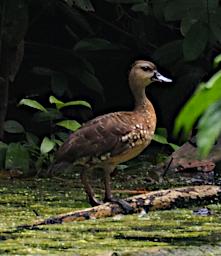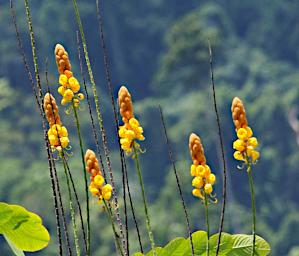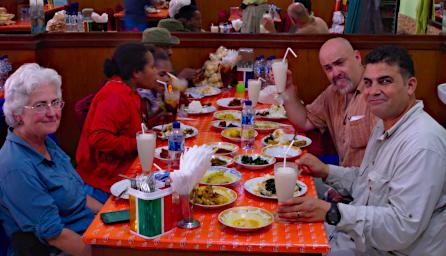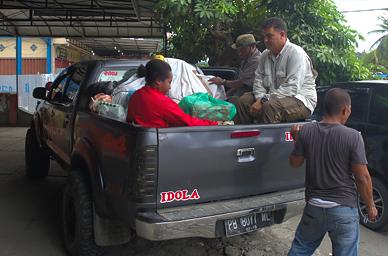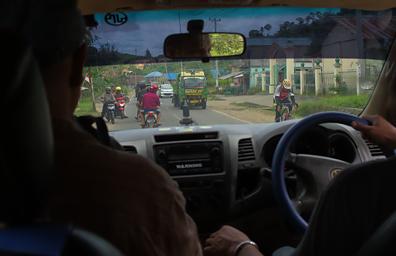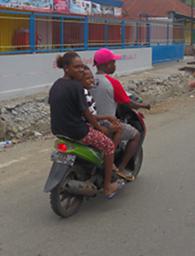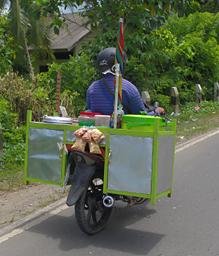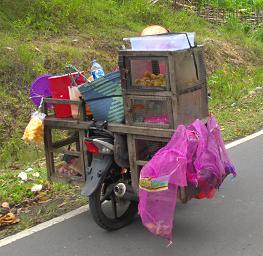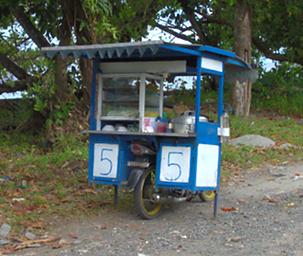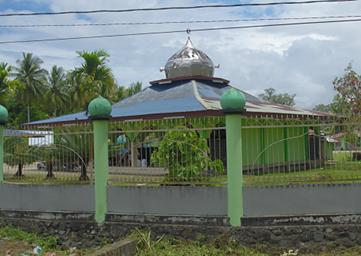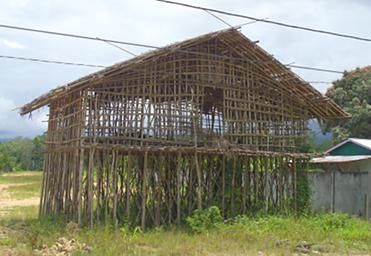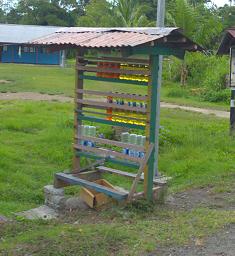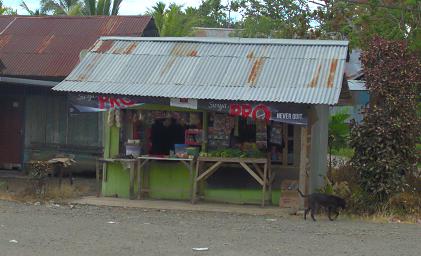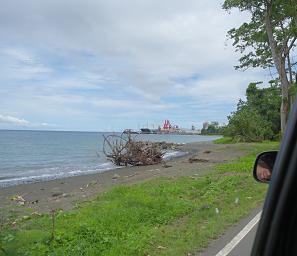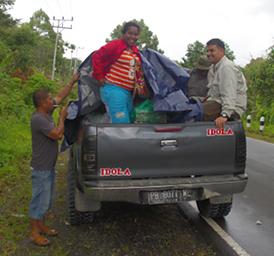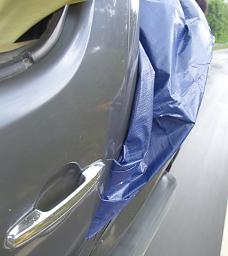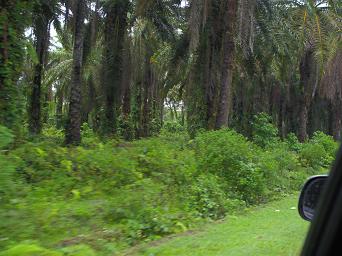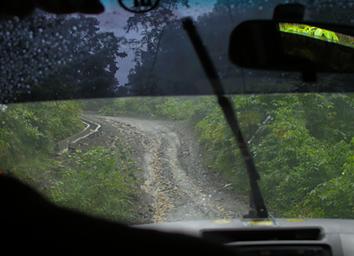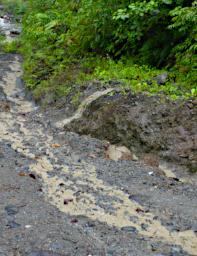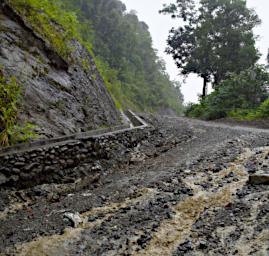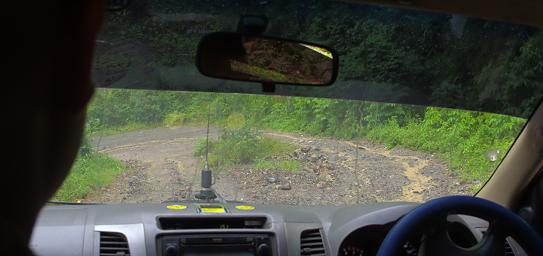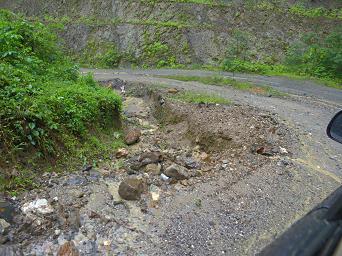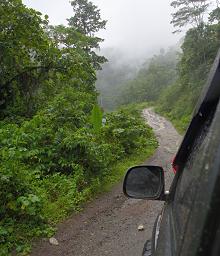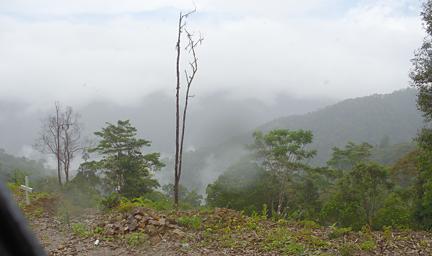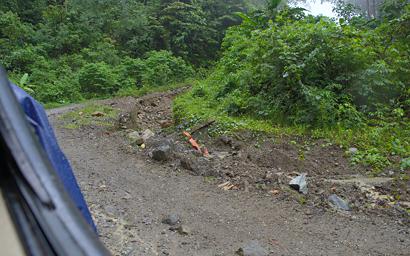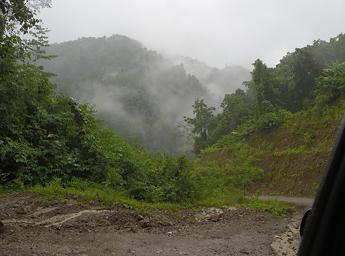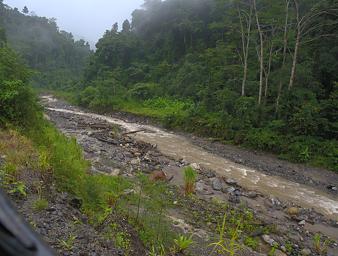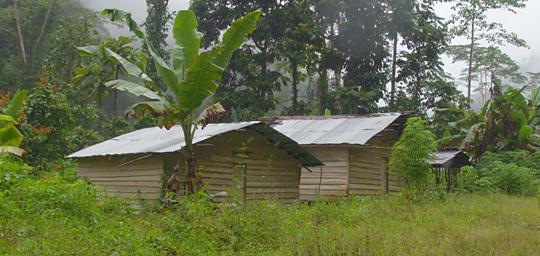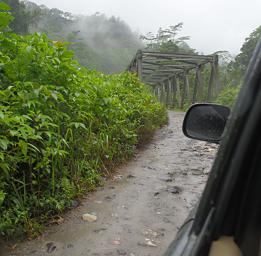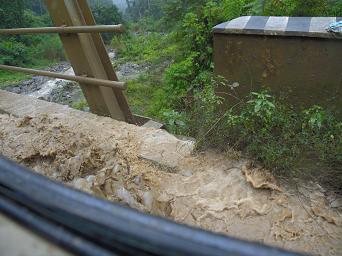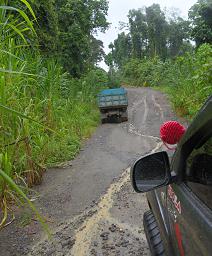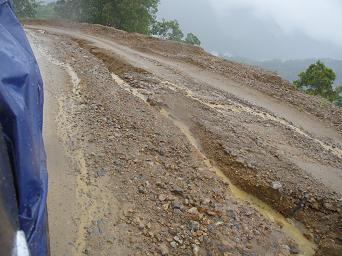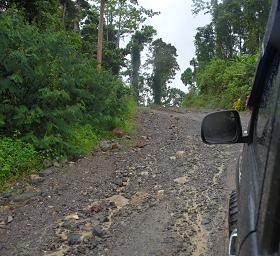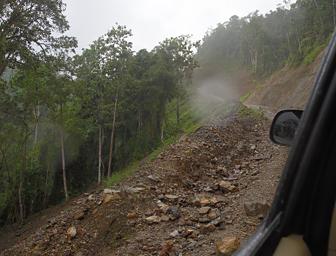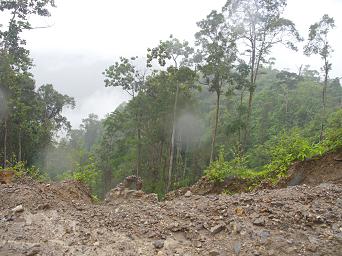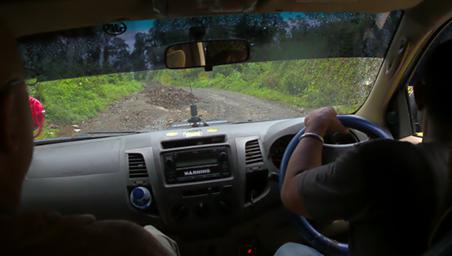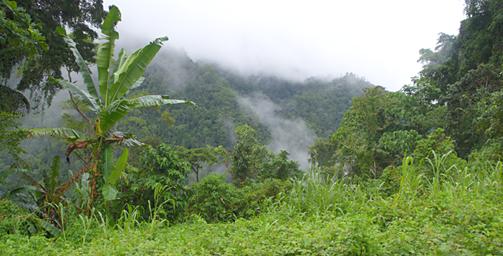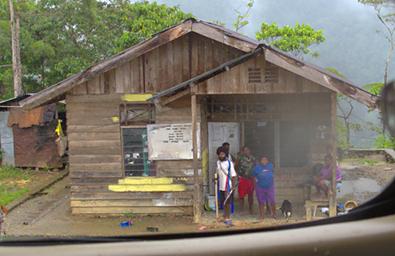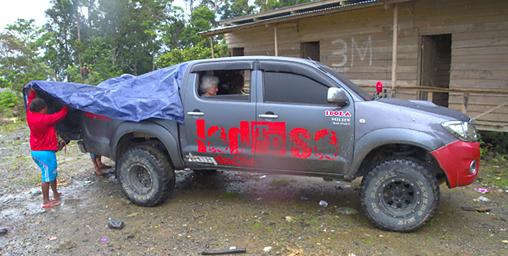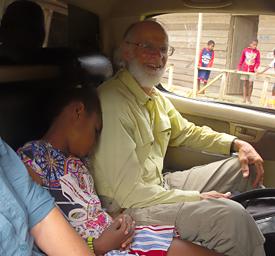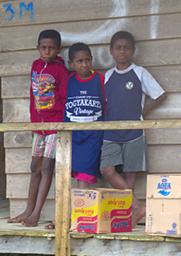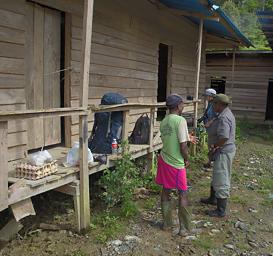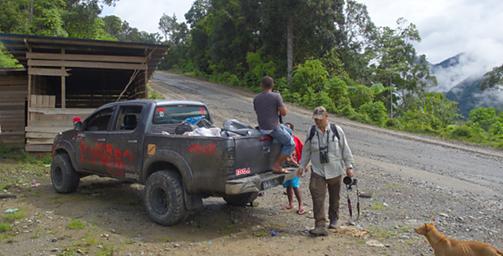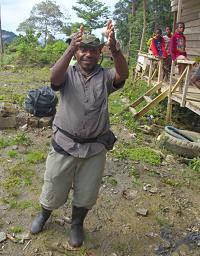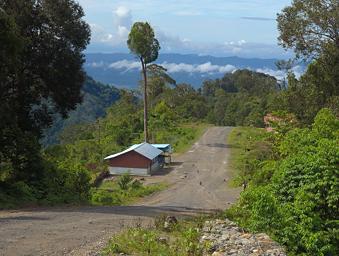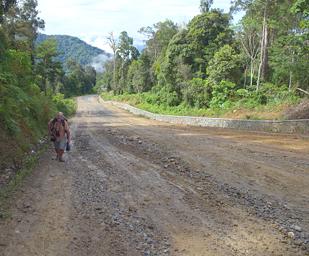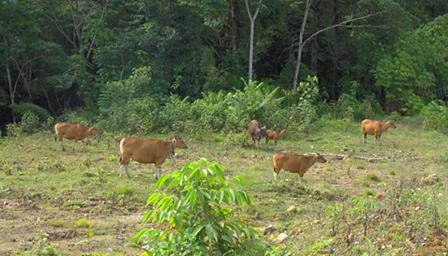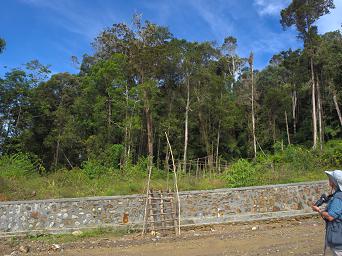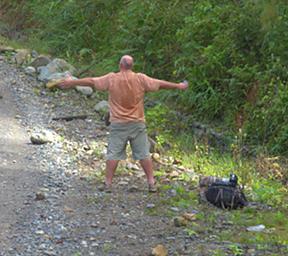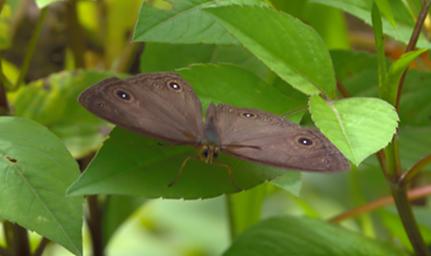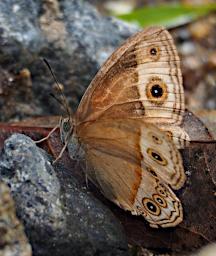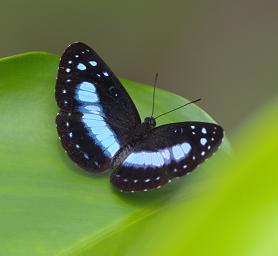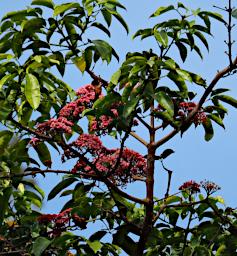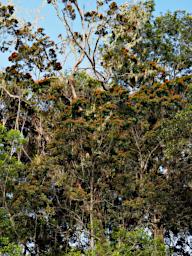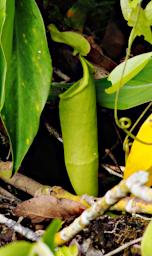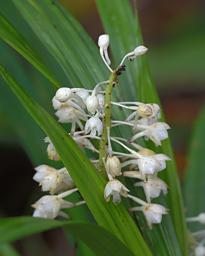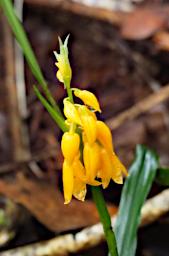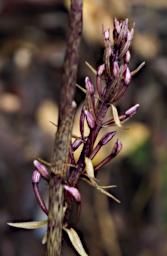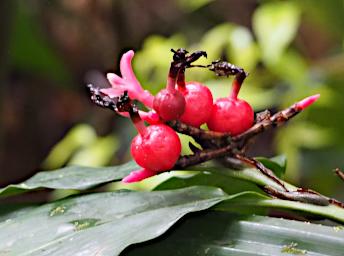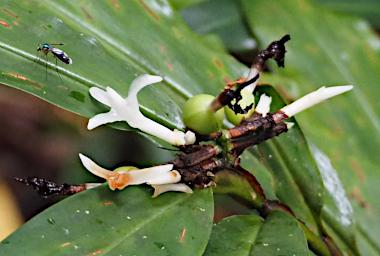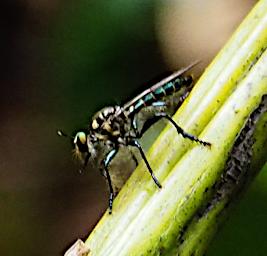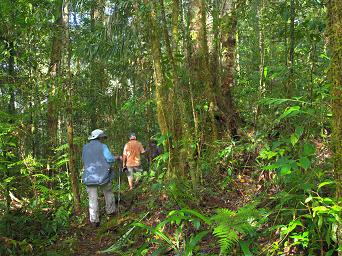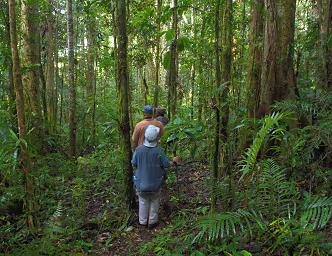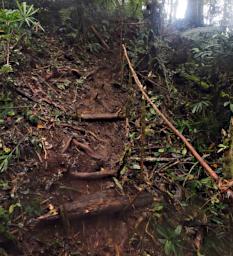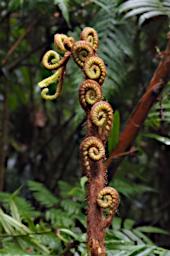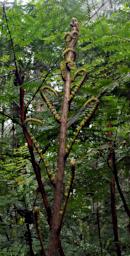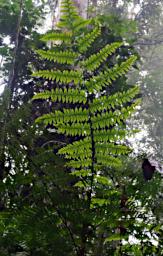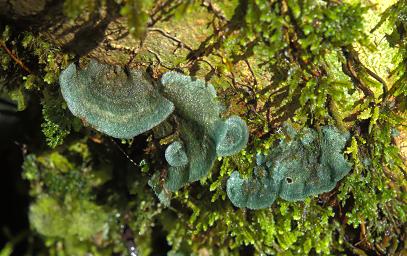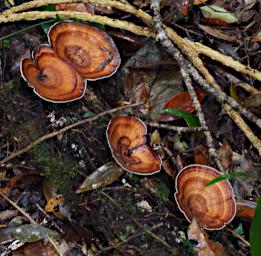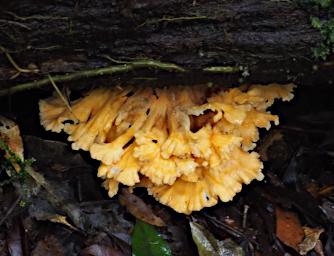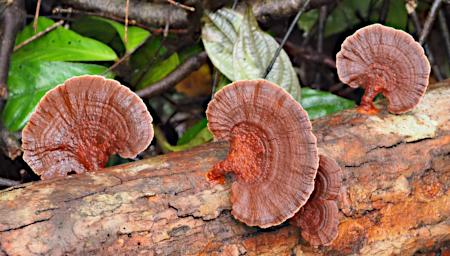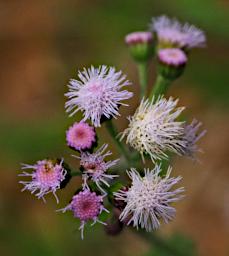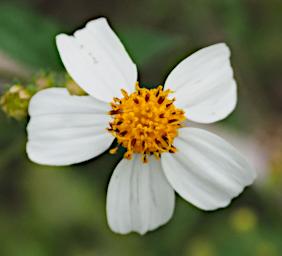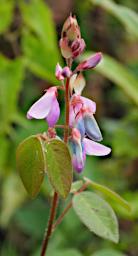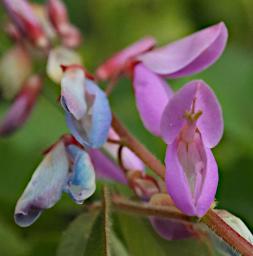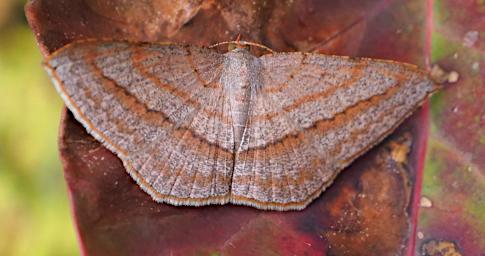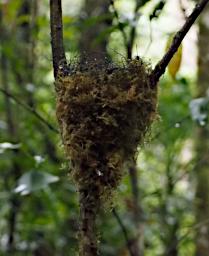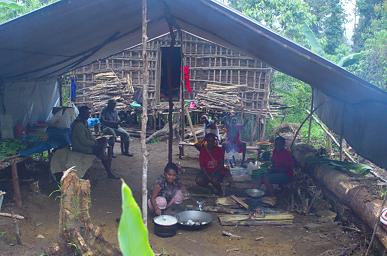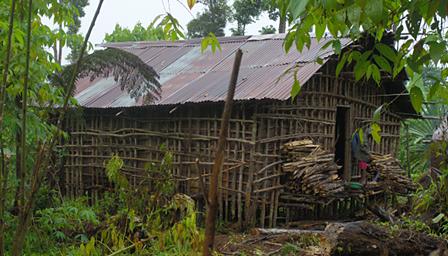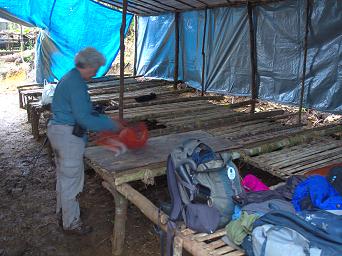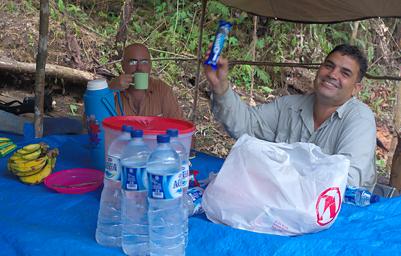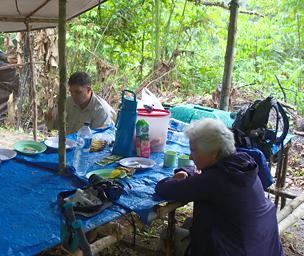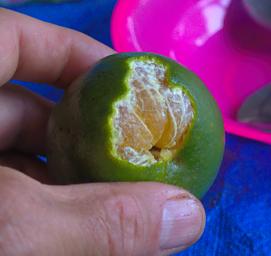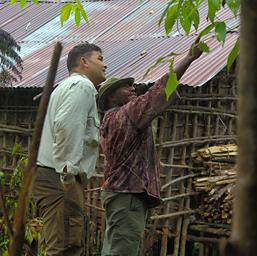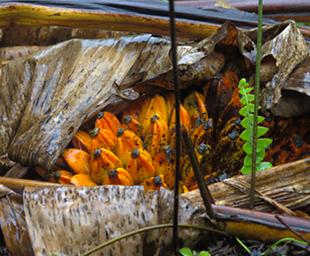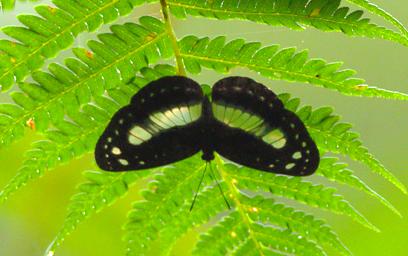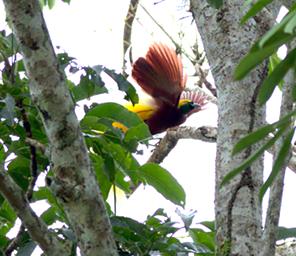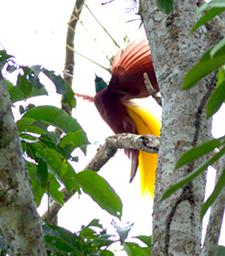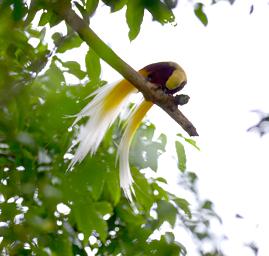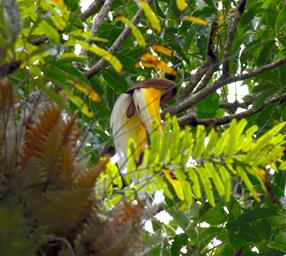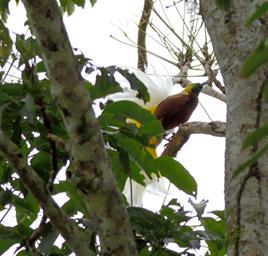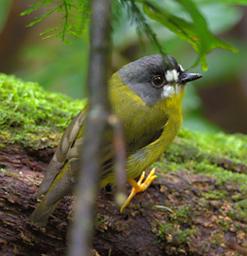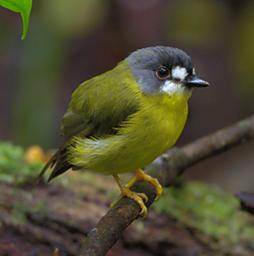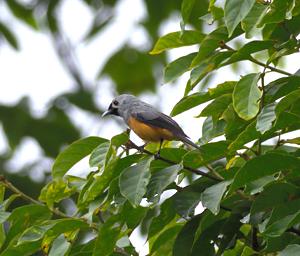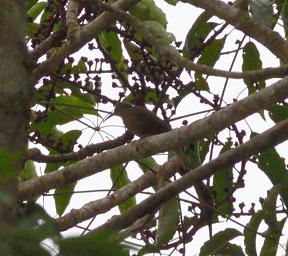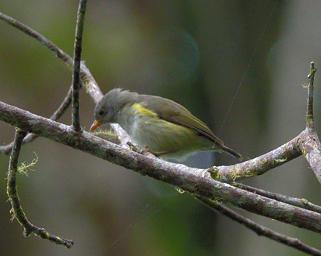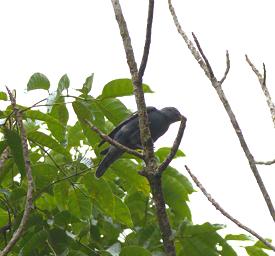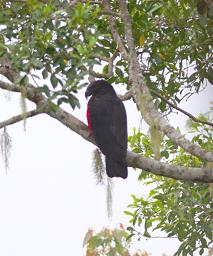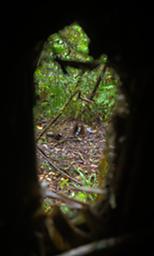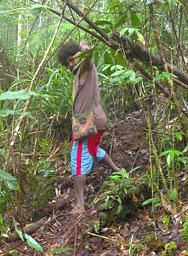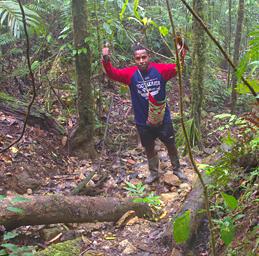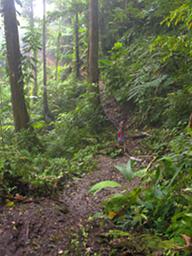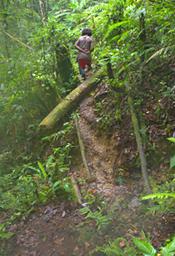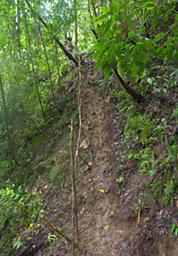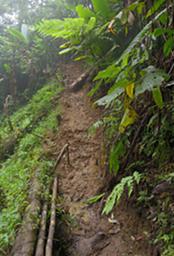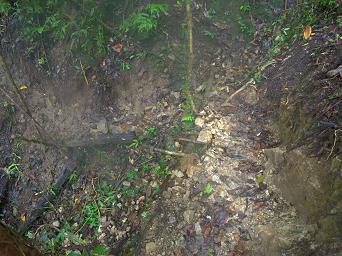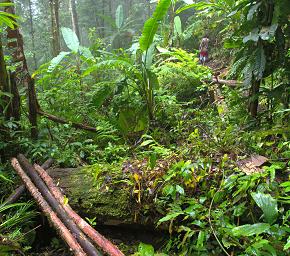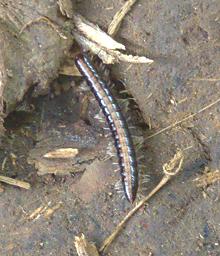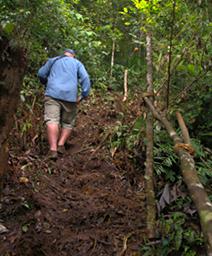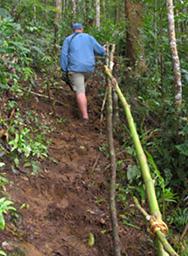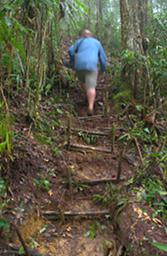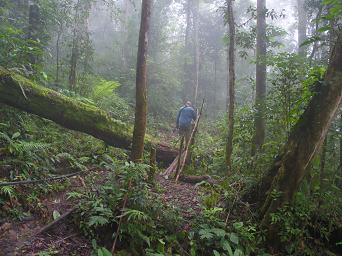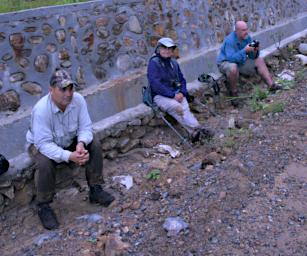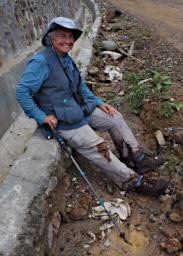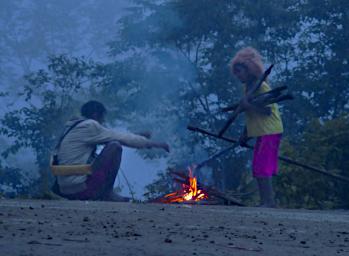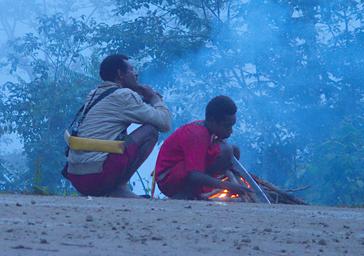Searching for Cool Birds in West Papua, Indonesia
Arfak Mountain Lowlands
September 2017
Click on any image for a larger view;
Contact garya at this domain if you would like the high quality image for printing
As we flew into Manokwari the world looked muddy; there was a riverbed below us, but it was mostly without water. Mehd's favorite driver met us in his Toyota Hilux truck. That link is for the Hilux as advertised in Indonesia. It focuses on 4wd off-road performance, for a reason. The ad is significantly different from the Toyota Europe ad :-).
We saw a few birds and flowers as we headed out from the airport.
We picked up Zeth, our local Indonesian guide, along with his wife and daughter. Then we headed for a place to eat lunch, where we got a taste of the local cuisine and way of serving food. If I got it right, you order and they bring out the food, group style, in the middle of the table. Then everybody forks what they want onto their plate. At the end of the meal, the servers take the stuff from the middle of the table back, and you pay only for the part you eat. At least I think that was the deal. When we first arrived, there was some kind of bean-like thing heaped on the table; they had obviously just bought a bunch and were in the middle of preparing it. It took a bit to get the table cleared and set up for us to eat. Mehd suggested we all have this drink, which was pretty good but I can't remember what it was.
After lunch we headed to a grocery store where we stocked up. I made sure we had raisins, and Dona made sure we had kit-kats. We stocked up on rice, fruit, veggies, bread, eggs, and other stuff.
Then we piled the groceries in with our gear and hit the road. Since we were in a pickup, there wasn't a whole lot of room. Mehd, Zeth, and Zeth's wife road in the bed with the gear and food.
The motorbike is a ubiquitous means of travel in Indonesia, and they were everywhere. They pile as many people as they can on one, and have some pretty creative ways of building them out to carry huge loads and serve various purposes.
One of the things I had forgotten but soon remembered from my trip to Bali in 2006 was the roadside gas station. Instead of a regular filling station, small vendors would have a 55 gal. drum from which they filled plastic 1-liter bottles with fuel. This doesn't work great for cars and trucks, but it works well for motorbikes, and there are a lot of those. The display shelves looked like soft drinks.
As we headed into the mountains, the weather deteriorated. Our driver pulled off and stopped to get out another tarp. He wanted to rig something so the people riding in back didn't get soaked. The truck didn't have tie-down points towards the cab, at least not on the outside, so he just opened the door, tucked the tarp in, and closed it. It seemed to work pretty well.
Palm oil is one of the scourges of the modern food and cosmetic industries. It is highly profitable and as a result huge tracts of land are being laid waste to make way for palm plantations. We saw this when I went to Borneo a few years ago, and it was now happening in Papua.
As we headed into the mountains, the roads steadily deteriorated. It was soon obvious why everyone had Toyota Hilux trucks. There were small streams running down the road, and ruts you could bury a medium-sized animal in. There was some concrete, but it was used to build a heavy-duty gutter at the side of the road to carry water away from the road, not for the road itself. The sides of the road were calving off in numerous places, and we frequently stopped to wait for a vehicle coming in the opposite direction. It was a slow trip, changing sides every hundred meters or so to find the most passable place. An adventure in driving...
Unfortunately, we couldn't see much of the surrounding countryside / terrain because of the cloud cover. About all we could tell was that it was heavily forested.
As we crossed one bridge I noticed the stream of water at the side of the road eating away at the bank where the concrete of the bridge ended. Not exactly encouraging...
After quite a while we pulled up alongside a building with women, children, and a formiddable looking guy with a beard and a machete standing under the porch staring out at us. They turned out to be our porters and camp-tenders for our low elevation camp.
We pulled over and parked next to a building with "3M" written in big letters on the wall. A strange place for advertizing; surely it was a reference to something else?
Zeth's daughter had fallen asleep on my shoulder during the ride up; I was reluctant to disturb her to get out.
Mehd explained to us that we were going to hike to our low elevation camp for only one night, and that we should consolidate our baggage and just bring what we needed — sleeping bags and pads, raingear, camera gear, etc. The rest we would leave here. Dona and I packed our stuff into my big backpack, with our raingear and camera gear in our day packs. Mehd had not been to this camp before; Zeth had told him about it and we were checking it out. The weather cleared up a little; there were faint shadows occasionally.
Zeth was great at explaining things. A friendly guy who spoke good English, enthusiastic about what he did and helping his people and the birds he was hoping to show us.
We started by hiking a ways further up the road. When we came to where it looked like a trail headed off into the rainforest, we stopped and waited for Mehd and Zeth who were finalizing arrangements with our porters. There were a few cows grazing nearby; I was surprised to see cattle in a place where there was virtually no grass and nothing but dense forest. Ram loosened up, and we enjoyed a rare bit of sunshine. It was the last we would see for a while.
Right away we found some cool stuff — flowers, butterflies and carnivorous plants. Dona even took pictures with blue sky. I don't know how she managed to do that.
Occasionally a bird would zip past, or we would hear a call, and Zeth would tell us what it was; but it all happened so fast I was totally lost. Dona was smart and concentrated on what she could see.
The hike started out pleasant enough, easy enough... Sunshine, not too steep, not too muddy. But by the end there was a longish steep hike down to camp. It was muddy, slippery and difficult. In some places they had built makeshift "railings," but the railings were of flimsy saplings or sticks and the posts supporting them were flimsy sticks or saplings. It you had leaned or fallen on them they would not have done much good. There were no water-bars and few steps; instead the trail builders cut off a stick about 3 cm in diameter and pounded it into the ground at an angle; you could step just uphill of the stick and it would keep your foot from slipping down. Seth and his protégé, whose name I don't remember, helped Dona down in places.
Since the distinction between butterflies and moths is now blurry, they're all butterflies as far as I'm concerned...
This was the first place we encountered communal spider webs. Wow! They were awesome. Apparently one advantage over individual webs includes the ability to subdue larger prey such as birds, bats, and larger insects. How long 'til they can capture people?
We weren't sure what to expect at the camp, although Mehd attempted to describe it for us. There was one enclosed structure made of small saplings, used as the guides' and helpers' quarters; other structures were a stick frame with tarps over them. They worked well, although the floor was muddy in places due to inadequate ditching around the perimeter.
I was impressed with our sleeping quarters. There was a continuous raised platform along each side with holes every one or two people spaces to allow you to put your feet down to put on boots, etc., without having to scootch to the foot of your place. The raised platform was built of small sticks, some split, so it was a slatted floor; it was pretty much level. Water would not puddle on it and it would dry out relatively easily. We rolled out our sleeping pads and I, for one, slept well.
We plopped down and ate lunch, including green oranges and some decadent chocolate things for dessert like oreos and kit-kats. Dona gave the three small boys who were hauling water for camp kit-kats, a real treat!
I thought it was dry most of the night; at least drier than the drive up. But the next morning it started raining as we got up and continued all morning. There was no point in going to the blinds; the birds won't visit their leks and display in the rain.
We sat around cleaning our cameras, fiddling with them. The guides and porters sat around sharpening their machetes. We were like commandos cleaning their weapons. So while we were sitting around Zeth told us about how he became a bird guide.
In 1990, David Gibbs, a British naturalist, went to Indonesia looking for birds-of-paradise. He ended up in Zeth's area and was asking around for someone to show him some birds. Everyone he talked to said he should go find this young kid — Zeth. At the time, Zeth was 19. He didn't like school and didn't like studying. His family couldn't afford to send all of their kids on for more education, so Zeth said something like "That's ok, I just want to be out in the forest." And that's what he did. He spent his time out in the forest, learning about the creatures and hunting.
When David Gibbs first approached the local people, they were somewhat afraid of him — he was a white person, and white people have historically been associated with all sorts of trouble in West Papua. When Gibbs first approached Zeth, Zeth was a bit scared. Zeth says, "I no say hello. He already knew my name. I never met him. How does he know me?"
They went out looking for birds. As far as Zeth knew at the time, the only reason to go looking for birds was to kill them for food and to get their feathers for ceremonial dress. Zeth saw Gibbs shoot at birds with his camera, but they always came back with no birds. Every time Gibbs would shoot at a bird and nothing would happen, Zeth was disappointed. Zeth would point at the game pocket in the back of his jacket to indicate they needed to get birds for food.
At one point after David kept failing to kill birds, some of Zeth's helpers tried to shoot at the birds. Gibbs told them "No, No, sit down." Then they tried to surround the birds and drive them to David, but he said "No, No, sit down."
At the end of his time with Zeth, David went to pay Zeth, but Zeth said, "No, you don't pay me anything. I didn't do any work because we didn't bring any food home." But David paid him, and Zeth didn't understand it.
So Zeth went to church to ask what was going on. The missionary told him this was bad, this was not work because he did not get any food. (I think Zeth said the missionary didn't pay the local people very much to do work and he didn't want outsiders coming in and raise the pay scale. I'm not certain about that part.)
Months passed, but David came back later and brought pictures of the birds with him, and pictures of Zeth. Zeth thought, "How does that work? I didn't get into the camera!"
Zeth learned as he went along. The first blind he made was only one meter from the lek. It didn't work too well.
Zeth made a blind up in a tree but David said "No, we can do it from the ground." He was afraid people would use the blind for hunting the birds.
Now, many years later, Zeth has gone on to school, learned to speak English, learned much more about birds, and educated his whole village about the value of birds as live creatures. The village is much better off as a result of being a destination for people wanting to see the birds alive.
I found some kind of fruit attached to some leaves that had obviously been cut stacked up near the mess tent. I meant to ask Mehd or Zeth what kind of fruit they were; they looked somewhat like maybe a starfruit, but got distracted. I couldn't understand why they were lying on the ground instead of in the cook tent! Maybe they were used at some kind of bird feeder or as an attractant at a lek.
It finally stopped raining enough for us to head out looking for birds. Ram, Mehd and I went up to the blind for the Masked Bowerbird; Dona headed to a blind for the Magnificent Bird-of-Paradise. After two hours Ram and I gave up and headed back down to camp to look for the Lesser Bird-of-Paradise and anything else we could find. The Masked Bowerbird showed up briefly for Mehd shortly after we left, but it was only a momentary appearance. We found some cool butterflies, especially one with partly transparent wings.
I had indicated I wanted to go back to the Masked Bowerbird bower after lunch, since Mehd had seen a bird there. I was hoping maybe the weather would improve and it would return. But Zeth had another bower where he had seen some so he sent me off with his apprentice / understudy and a couple of helpers. The trail was not the best — muddy and narrow, up and down, slippery log crossings, and often at a slant. We took off at a good clip; I was pretty much totally occupied keeping up, and didn't spend time looking around for much of anything of interest. I think these guys were used to zooming through the woods and not wandering slowly to see what might be around. They were definitely not used to leading old slow westerners through the forest! So a little more training in that regard is needed, as is some training on ambling along to see what you can see. But maybe we needed to be in a hurry to maximize our chances of seeing a bowerbird. In any case, we arrived at the bower, plopped down, and sat and watched. And sat and watched. And sat and watched. For about two hours. To no avail. Pooey!
Toward afternoon we headed out; it was a steep, muddy, slippery hike out and we still had to drive up to Zeth's village where we were spending the rest of our time in the Arfak Mountains.
It was 18:30 by the time we all got out to the road. Then it turned out we didn't have an actual vehicle pick-up arranged; we were going to hitch-hike. Zeth's village was about an hour's drive further up the bad road up the mountain. Unfortunately, most of the vehicles were coming down the mountain, and the few going up were stuffed full. No-one was making a very energized effort to get any of the vehicles, especially those going down the mountain, to stop. It was starting to get dark. Some of our porters built a fire to keep warm.
As it got darker and darker, Ram finally just stood out in the middle of the road with his hands wide, forcing the next vehicle to stop. The vehicle was headed the wrong direction — down the road; but what the heck... The truck was full — a man with his wife and father or father-in-law and a kid or two, plus a bunch of stuff in the back. Mehd made him an offer he couldn't refuse, and he told his passengers to get out and unload a few things. He turned around and our group piled in; I rode in the back standing up with two others. It was quite a ride, but we arrived at Zeth's village in good shape.
